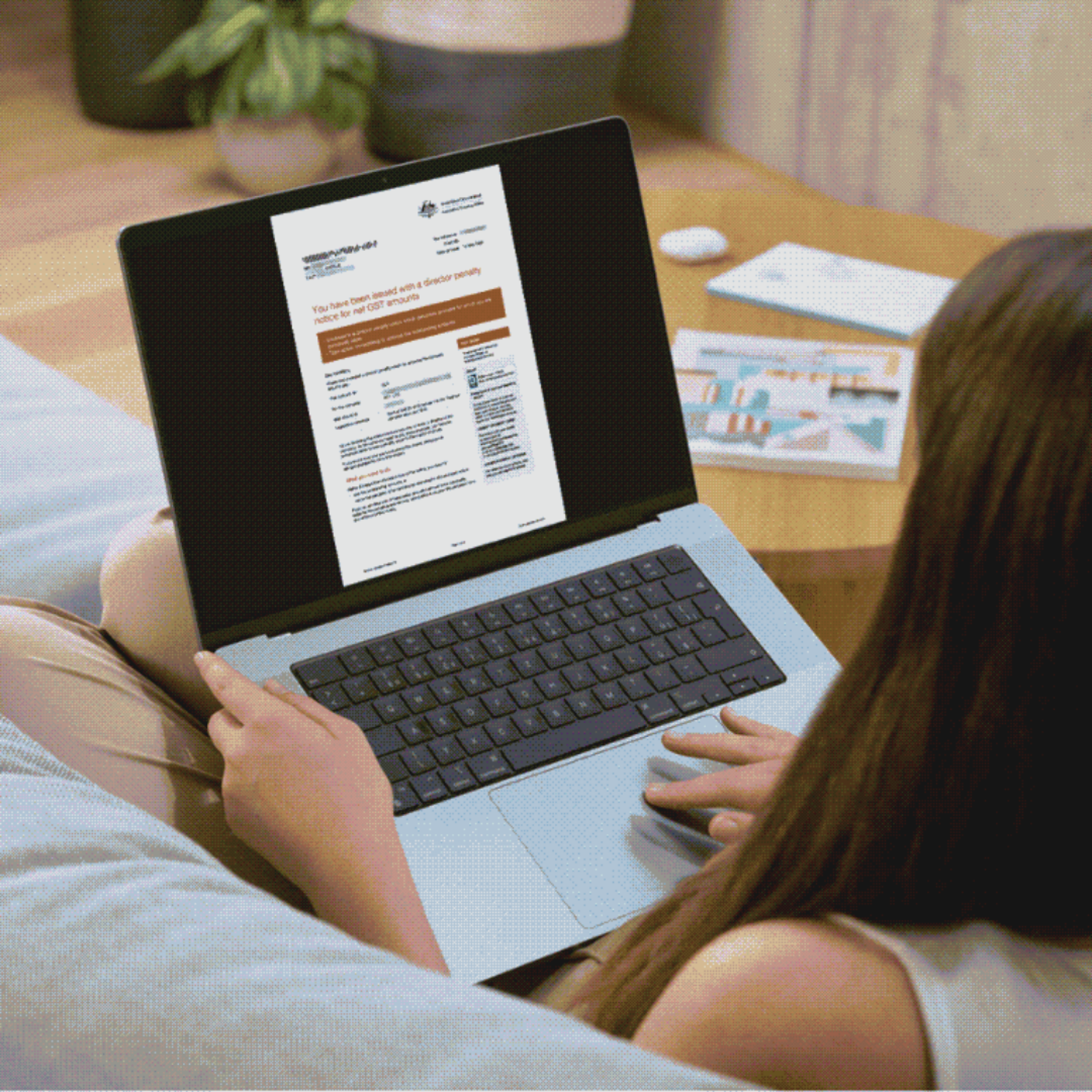Receiving a Director Penalty Notice (DPN) from the Australian Taxation Office (ATO) is a situation no company director wants to face. A DPN holds you personally liable for certain unpaid company tax debts, creating significant financial risks. But what causes a DPN to be issued in the first place?
This article breaks down the common triggers for a DPN, explains how to recognise red flags, and offers practical tips to help you avoid personal liability.
What debts are included in a DPN?
Before understanding what triggers a DPN, it’s crucial to know the types of debts included:
IAS DEBT | Pay-As-You-Go (PAYG) Withholding Tax: These are amounts withheld from employees' wages and must be paid to the ATO.
BAS DEBT | Goods and Services Tax (GST): Tax collected on behalf of the ATO through your business’s sales.
SUPER DEBT | Superannuation Guarantee Charge (SGC): Unpaid employee superannuation, including penalties and interest, can also lead to a DPN.
These core debts must be reported and paid on time to avoid triggering a DPN.
Trigger #1: Late lodgement of returns
The most common reason directors receive a DPN is late lodgement of BAS, IAS or SGC returns.
When returns are late:
The debts may fall into the lockdown DPN category, where personal liability becomes immediate.
The ATO loses visibility of the company’s compliance, increasing the likelihood of enforcement action.
How to avoid this trigger
Always lodge BAS, IAS and SGC returns on time, even if you cannot pay in full.
Use Single Touch Payroll (STP) for accurate and timely PAYG reporting.
Trigger #2: Unpaid tax debts
Even if your lodgements are on time, unpaid tax debts can lead to a 21-day DPN. The ATO may issue a DPN as a way to force directors to address outstanding amounts.
How to avoid this trigger
Set up a complying payment plan with the ATO as soon as you recognise your business cannot pay debts in full.
Make regular payments, even while waiting for ATO approval of a plan.
Trigger #3: Non-compliance with ATO payment plans
If your company is on an ATO payment plan and fails to meet its obligations, the ATO may issue a DPN. Missed payments signal financial instability and may prompt the ATO to take stronger action.
How to avoid this trigger
Communicate with the ATO immediately if your business struggles to meet a payment plan.
Renegotiate terms before the plan defaults.
Trigger #4: Poor financial management
Inconsistent financial management can lead to unintentional non-compliance with tax obligations. This includes:
Failing to monitor due dates for lodgements or payments.
Underestimating cash flow needed for BAS or super contributions.
How to avoid this trigger
Implement robust accounting systems to track compliance deadlines.
Work with an experienced bookkeeper or accountant to manage your company’s finances.
Trigger #5: Outdated ASIC records
A DPN is sent to the personal address listed with ASIC. If your address is outdated, you may miss the notice entirely, causing the 21-day window to lapse without your knowledge.
How to avoid this trigger
Regularly update your personal address in the ASIC register.
If you suspect your company is at risk, check your ATO portal for notices, as DPNs are often reflected there.
Trigger #6: Persistent non-compliance
Directors of companies with a history of late lodgements, unpaid taxes, or defaulted payment plans are more likely to receive a DPN. The ATO’s systems flag repeat offenders for enforcement action.
How to avoid this trigger
Address financial difficulties proactively to prevent ongoing non-compliance.
Seek professional advice early to resolve issues before they escalate.
Proactive steps to avoid a DPN
To minimise your risk of receiving a DPN:
Stay compliant
Lodge all BAS, IAS and SGC returns by their due dates and pay what you can, even if it’s partial.Set up payment plans
Demonstrating willingness to resolve debts can reduce enforcement actions by the ATO.Monitor your records
Keep your ASIC details updated to ensure timely receipt of notices.Seek advice early
Engage insolvency or restructuring professionals if your company is struggling financially.
What to do if a trigger applies to you
If you recognise any of these triggers in your company’s operations, act now to address the underlying issues. The earlier you act, the more options you’ll have to avoid personal liability.
For example:
If returns are late, prioritise lodging them immediately to prevent further lockdown DPN liabilities.
If debts are unpaid, contact the ATO to negotiate a payment plan or consult a professional to explore restructuring options.
Real-life example: Late lodgement leads to lockdown DPN
Sam was the director of a cleaning company that failed to lodge BAS returns for six months. When the ATO issued a lockdown DPN, Sam was automatically liable for $80,000 in GST and PAYG debts. With no option to restructure or liquidate the company to avoid liability, Sam had to sell personal assets to pay the debt.
This situation could have been avoided by lodging the BAS on time, even without payment.
Key takeaways
Understanding the common triggers for a DPN empowers you to take proactive steps to avoid one. Whether it’s ensuring on-time lodgements, managing cash flow effectively, or seeking professional help early, these actions can protect you from personal liability.
If you’ve identified risks in your business or suspect a DPN is imminent, contact Business Reset today. Our team can help you navigate your options and avoid unnecessary financial stress.
Read next: Received a Director Penalty Notice? Your Step-by-Step Action Plan
Previous: The two types of DPNs: 21-Day DPNs versus Lockdown DPNs
Or back to: Director Penalty Notices (DPNs): A Fast-Track Guide for Company Directors



